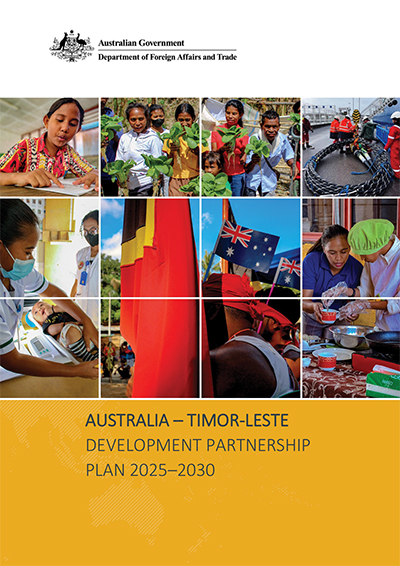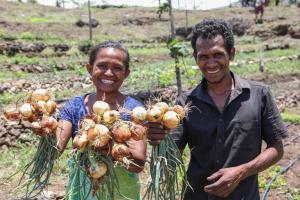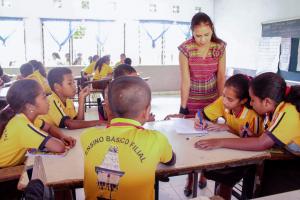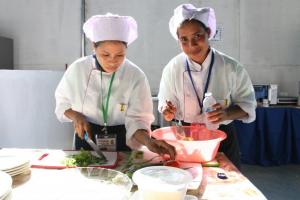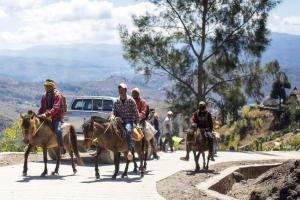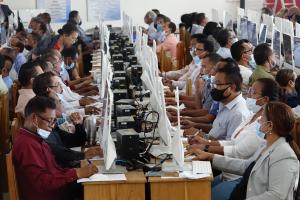-
2025-26 bilateral allocation [budget estimate]
-
$99.7 million
-
2025-26 total Australian ODA [budget estimate]
-
$135.9 million
-
2024-25 bilateral allocation [budget estimate]
-
$82.8 million
-
2024-25 total Australian ODA [budget estimate]
-
$123.3 million
-
2023-24 total Australian ODA [actual]
-
$122.0 million
Australia and Timor-Leste are close neighbours and friends that share deep and enduring ties. Australia has been at the forefront of international support for Timor-Leste and remains Timor-Leste's largest development partner.
Joint Objectives of the Australia-Timor-Leste development partnership
The overarching goal for the Australia-Timor-Leste development partnership is to promote Timor-Leste's prosperity, stability and resilience, and build strong links between our two countries.
The Australia-Timor-Leste Development Partnership Plan 2025-2030 (DPP) translates into action the development priorities Australia shares with Timor-Leste. The DPP sets out four agreed objectives, how we will work together to deliver shared outcomes, and how progress will be monitored.
The Australia-Timor-Leste Development Partnership Plan was prepared in close consultation with government and non-government stakeholders. It replaces the Timor-Leste COVID-19 Development Response Plan.
Objective 1: Quality Services
Australia is partnering with the Government of Timor-Leste to deliver essential services across the country – including to the most vulnerable – through efficient budget allocation, improved service quality and strong oversight.
Our support for essential services includes our partnership with the Government of Timor-Leste Ministry of Finance, key line ministries and other development partners to strengthen the systems that underpin good public financial management, including planning, budgeting, monitoring and reporting.
A healthy, educated workforce is critical to Timor-Leste's future productivity and growth. Strengthening Timor-Leste's health system is a key priority as strong health systems form the critical foundation for health security. Our support for Timor-Leste's health system also contributes to efforts to address malnutrition. We also support improvements in access to water and sanitation, hygiene promotion and food production.
In education, our support focusses on improving student learning outcomes in basic education and is aligned with the Government of Timor-Leste's broader education reform agenda and support for quality education. This includes support for inclusive education to improve teaching practices for children with disability.
Our support will continue to prioritise gender equality and disability inclusion across our development program.
For more information on Australia's support for Timor-Leste's to deliver quality services, visit the Quality services page.
Objective 2: Inclusive and sustainable economic growth
Growing and diversifying the economy is crucial for Timor-Leste's sustainable development. Australia is supporting private sector development, and improved access to international and regional organisations to promote trade, and skills and labour mobility opportunities.
Australia is supporting Timor-Leste to deliver enabling infrastructure that will increase connectivity, create local jobs and private sector growth and bolster climate change adaptation. We are increasing our investment in Timor-Leste's national economic infrastructure through transformational projects, including a fibre optic submarine cable between Australia and Timor-Leste and the redevelopment of Dili's international airport.
We are investing in skills through strengthening technical and vocational education institutions. Our Australia Awards scholarships and short courses are helping to build a pipeline of highly qualified and respected professionals and leaders. Across our programs, we are targeting increased skills development and employment opportunities for women and people with a disability.
For more information on Australia's programs to support Timor-Leste's economic prosperity, visit the Inclusive and sustainable economic growth page.
Objective 3: Sovereignty, stability and resilience
Australia partners with the Government of Timor-Leste on investments that enhance people's trust in their government. We have long-standing partnerships with the Timor-Leste National Police (PNTL), the Timor-Leste Defence Force (F-FDTL) and Ministry of Defence. We proactively support Timor-Leste's Women, Peace and Security Agenda through our policy dialogue, and defence and policing cooperation.
Timor-Leste is an essential voice in regional and global fora. Australia is supporting Timor-Leste to meet its requirements for ASEAN accession through technical and advisory support and a new program of English language training for ASEAN accession which will build the capacity of Timorese officials engaging with ASEAN mechanisms.
Climate change is expected to challenge agricultural productivity and access to water and increase the severity and frequency of extreme weather events. We are responding to the impacts of climate change through investment in community resilience including in water security, community preparedness and adaptation. We support Timor-Leste to build sovereign institutional capacity to lead and coordinate in crises.
We will continue to share knowledge and build migration management capacity, as well as countering and deterring people smuggling and human trafficking.
For more information on these programs, visit the Sovereign, stable and resilient nation page.
Objective 4: Supporting all Timorese people to equally thrive and prosper
Timor-Leste and Australia share a commitment to ensuring that all people can participate equally in our society.
We support essential services to respond to violence against women and children. We also support communities and the government to take action to prevent violence against women and children. We support local advocates and maintain our own advocacy so that the voices of women and girls are amplified and considered in policies and programs.
We support Organisations of Persons with Disabilities and the Government of Timor-Leste to deliver targeted support for disability inclusion, with a particular focus on access to inclusive health and education services.
Timorese youth play a central role in the country's development, democracy and social cohesion. We work with youth-focused civil society organisations to increase the participation of young Timorese in community and decision-making processes.
For more information on these programs, visit the Supporting all Timorese people to equally thrive and prosper page.


